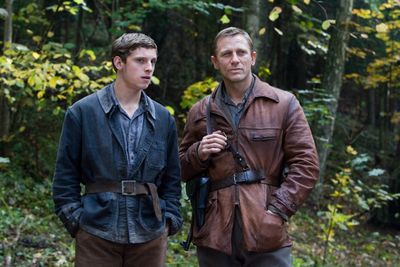Zwick tries for big, bold in ‘Defiance’

Things didn’t have to work out this way for Edward Zwick. The “thirtysomething” and “My So Called Life” co-creator broke into the movies with “About Last Night” and could have managed a perfectly lucrative career with lighter fare – “relationshippy” films.
But what he really wanted to be was Ken Burns.
“It’s hard not to want to become Ken Burns, at times,” says Zwick, 56. “I’m interested in being a Ken Burns who reaches that 17-year-old who goes to the multiplex just to see a good story well-told. And if there’s history in it, all the better.”
The director of “Glory” and “The Last Samurai” has made films about military excesses in a time of terrorism (“The Siege”) and the illicit trade in conflict diamonds (“Blood Diamond”).
They are always movies “about something, big stories with an epic quality to them,” says Daniel Craig, who set aside his James Bond tux to star in Zwick’s latest, “Defiance,” a World War II Holocaust-resistance drama that is on many Oscar short lists.
“Growing up, movies were something my family and later my friends and I would stay up all night talking about,” says Zwick. “The movies I remember moved me and forced you to think about things that made you know yourself better.”
“Defiance” gives Zwick his shot at entering David Lean (“Lawrence of Arabia”) territory. It’s a Holocaust story, one that one-ups “Schindler’s List” and “The Pianist” in one important regard: It’s about Jews fighting back.
Craig, Liev Schreiber and Jamie Bell play brothers who lead their fellow Jews into the forests of Belarus and resolve to protect them from all threats.
“It’s deeply important because it adds complexity to an otherwise conventional portrait,” Zwick says. “There’s a kind of accepted Holocaust narrative, a standard monolithic account of this event and these people, and this story falls outside of that.
“The idea that the impulse to resist wasn’t there is incredibly destructive. It was always there. There was resistance everywhere. There were people escaping, people with access to weapons fighting back. It happened.
“It’s very important to not allow an over-simplified view of anything to exist, unchallenged, particularly when it comes to genocide. This movie may look back on what happened then, but it also speaks to more recent events. It’s not ancient history. We’ve all witnessed genocide in our lifetime.”
Zwick, who is Jewish, knew the stories of the Sobibor concentration camp revolt and the uprising in the Warsaw Jewish ghetto, “the poster children for Jewish resistance” to the Holocaust.
What struck him about the story told in Nechama Tec’s book “Defiance: The Bielski Partisans,” was the fact that he’d never heard about it.
“I was very moved to read about their efforts, the fact that they were not, by any normal, reasonable measure, heroes,” Zwick says of the Bielski brothers who formed the guerrilla group.
“They were self-interested, in the beginning,” he says. “And yet, what happened to them as events unfolded showed them rising to the occasion in the most magnificent, heroic way you can imagine.
“There’s a part of the story here that has nothing to do with the Holocaust, just men finding resources within themselves that they could not have known they possessed before the war started.”
Zwick’s bottom line: “I figure if the subject’s rich enough to hold my interest for two years, it should hold an audience’s interest for two hours.”